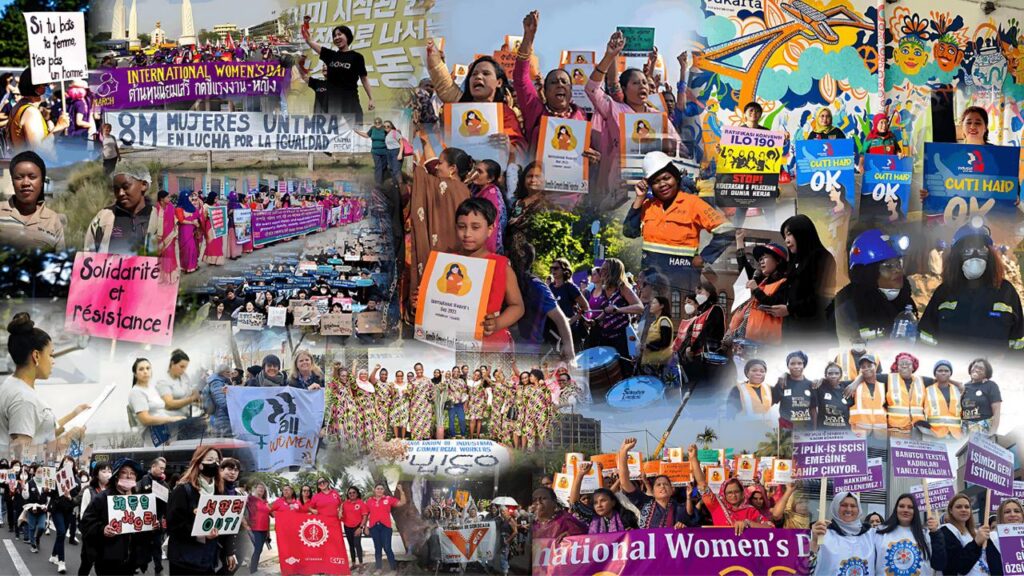5 June, 2025IndustriALL’s Women’s Committee met online on 26–27 May to start preparations for IndustriALL women’s conference and Congress in Sydney in November. It provided an opportunity to assess progress and evaluate systemic challenges.
In her opening statement, IndustriALL assistant general secretary Christine Olivier highlighted the role of the women’s committee in preparing for the upcoming Congress and evaluating progress made over the past four years. The committee has worked to advance women’s rights, promote equality and foster global solidarity, but certain issues remain, notably underrepresentation in leadership, gender-based discrimination and the disproportionate impact of AI and the Covid-19 pandemic on women. Efforts have been made to support affiliates and increase women’s participation, including conducting a participatory gender audit.
“Despite challenges in Congress preparations, we remain committed to progress. We are not where we need to be, but we are also not where we were and together, we will continue pushing forward for equality, justice and change,”
said Christine Olivier.
Discussions took place on the findings of IndustriALL’s participatory gender audit (PGA) and gender mainstreaming in both statutes and action plans. PGAs are social audits, as opposed to financial audits and an effective tool to identify gaps and good practices to tackle gender issues in an organizational setting. The IndustriALL gender audit, based on the ILO model, drew from over 130 documents, dozens of interviews and workshops with staff, leadership and affiliates to evaluate how well gender considerations are embedded across IndustriALL policies, actions and structures.
The PGA highlighted that IndustriALL has a clear vision for promoting gender equality and women's empowerment. The organization was commended for key initiatives, like its campaigns on gender-based violence and harassment (GBVH) and its mentoring programme. However, some gaps were also identified.
Based on both successes and areas needing improvement, several recommendations were made. These will serve as a basis for developing the Action Plan for IndustriALL's work over the next four years. A strong focus will be given in in more systematically and routinely embed gender perspectives in all its work to ensure the needs of all genders are addressed.
Gender mainstreaming requires a dual approach: combining specific, targeted actions with the integration of gender considerations into all policies and activities. While IndustriALL has made progress through targeted efforts, it should also routinely embed gender perspectives in all its work to ensure the needs of all genders are addressed.
“We need to strengthen the development of women and ensure that the priorities, needs and contributions of all workers are taken into consideration in all IndustriALL planning, implementation and monitoring of programmes, campaigns, interventions and budgets,”
said Armelle Seby, IndustriALL gender director.
Christine Olivier and Armelle Seby presented proposals to embed gender perspectives more deeply into IndustriALL’s statutes and forthcoming action plan. Since the Executive Committee meeting in Istanbul last year, negotiations involving women and other union leaders have resulted in compromises. Christine Olivier and Ilvana Smajlović, Women’s Committee co-chair, who led the discussions, stressed the importance of male union leaders working together with women in this effort to make progress towards an increased representation of women in IndustriALL and its affiliates’ structures, and more gender equality in our industries.
“Our main aim is to show unity at Congress and to have progress in terms of women's representation, not just within IndustriALL leadership, but also within the national and regional structures of our unions. We need to show solidarity and unity, not just now, but as a lasting commitment.”
The Congress in Sydney in November will be preceeded by a Women’s Conference, the first one since 2019. The conference will be held in two parts: an online session in September and an in-person session in Sydney. It will develop a four-year roadmap for IndustriALL’s gender equality work. Key topics include the future of women’s work, the impact of artificial intelligence and responses to attacks on women’s rights and gender equality.
Discussing mainstreaming gender in IndustriALL’s work on global framework agreements, presentations emphasized the responsibility of multinational corporations to ensure training, protection, and equality across global supply chains. IndustriALL’s gender equality task force has together with the Secretariat proposed recommendations to ensure that GFA guidelines and their implementation will integrate a gender perspective.
In a session on mainstreaming gender into occupational health and safety (OHS), Dr. Karen Messing highlighted the importance of considering both biological and gender differences. She emphasized that women are not small men, and even small biological differences matter for prevention. Limited research exists on how chemical and radiation exposure affects reproductive health in both men and women. Gender-based job segregation, both vertical and horizontal, creates different OHS needs. Even in the same job, men and women often perform different tasks. Messing showed how workplace design and equipment often overlook women's physical and reproductive health needs, as they are typically designed for men. Women may also hesitate to report risks, fearing they will be seen as weak.
Dr Jane Pillinger looked at diversity, gender and inclusion into risk management, adopting an intersectional approach. She expanded on the psychosocial risks women and marginalized groups face, like harassment, burnout, and discrimination, and underscored the need for inclusive, gender and diversity-responsive risk management and OSH strategies. She underlined the breakthrough represented by ILO C190 that puts the focus on prevention and psychosocial risks. Intersectionality can help reveal why some group face higher exposure to psychosocial risk. Addressing intersectionality also requires more nuanced policies and practices, and further research.
“We must ensure that gender mainstreaming is not just a talk show but leads to practical, protective measures,”
Jane Pillinger said.
Participant reflections from countries including Mauritius and Indonesia highlighted how C190 and psychosocial hazards are, or not, integrated into national legislation, and how global knowledge-sharing is fuelling advocacy.
As the meeting concluded, the women’s committee affirmed its shared purpose: to translate data, policy, and lived experiences into action.
“We are working for progress and we should show that we are making positive steps together. Our ultimate goal is to empower women,”
said Ilvana Smajlović.
